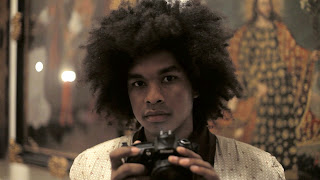Movie Review - An Oversimplification of Her Beauty
 |
| Writer-Director-Actor Terence Nance |
Unlike Malick's narration, Nance's voice-overs are more literal and straight-forward in language. After the opening credits, the voice of Reg E. Cathy is heard laying out directly what is about to happen. He says, "What you're about to see is a short film entitled How Would You Feel, created by one Terence Nance in 2006. How Would You Feel is an educational film that examines theories about how humans come to experience a singular emotion in its original form presented as a work of fiction. We will interrupt the film How Would You Feel from time to time with a new film titled An Oversimplification of Her Beauty. We will do this to provide the context necessary to tell a complete story."
How Would You Feel is told in volumes. The first of which is 15 minutes. It's a day in the life of Nance, a day that ends with him carrying long pieces of wood onto the New York subway and him finally getting back to his Brooklyn apartment only to learn that the date he had with a girl he likes is cancelled by her. Cathy in voice-over then asks the audience, "How would you feel?" The presumption is for the audience to put itself in Nance's shoes and situation and ponder what your personal or particular reaction would be.
Like Groundhog Day (1993), we see Nance relive this same day over and over. Each time, Cathy's voice as narrator is constant and un-ending, revealing more and more details that isn't known the first time around. Those more details emphasize Nance's struggle and desperation to be with this girl, connect with her and understand her, so that at the end of the day when we see her call off the date and Cathy again asks, "How would you feel," the answer is obvious.
Even in volume two, when Cathy's voice starts to enumerate the answers to his repeated question, it's more or less a redundancy to the tone and even to Nance's performance. The final shot of the 15-minute, volume one, which is of Nance, a lonely black man sitting in a rocking chair in the middle of his apartment, next to the bright window, after just gotten off the phone, sells and informs the answer of "How would you feel."
Clearly, the aim is to make Nance sympathetic and to make the audience empathetic toward him and his situation. Given that this was a scenario that happened to Nance in his real-life that he then decided to translate into a film, much like Christopher Scott Cherot did in Hav Plenty (1997), it's surprising how he doesn't demonize the girl who dumped him. Cherot does demonize the girl to a degree but only for comedic effect. Yet, he doesn't really allow the audience to get inside her head.
Nance, on the other hand, does allow us to get inside the girl's head. He allows her a rebuttal as it were. He does so under the premise that like him she creates her own short film about her impressions of the relationship and of him. Cathy's voice goes away, and the voice of Namik Minter is supplanted. Minter plays "the girl" in this scenario, the girl in question, the girl in which Nance's character is interested.
At this point, Nance's movie is already extremely meta with a graphic that appears on the screen, mimicking that of a DVD menu, as well as effects and sounds mimicking what one would hear if one were switching between VHS cassette tapes, going from Nance's short film to Minter's. It gets even more meta when within Minter's rebuttal, it's conceived as the couple going to a movie theater to watch said rebuttal.
Nance has Minter's narration be revealed as her reading from a book. At first, her words are so rich and textured. It's almost like poetic prose. Nance cuts back-and-forth to a scene of the couple in an art gallery or possibly an art museum. It's an obvious first-meeting for the couple. It's also perfectly representative as this passage seems to be about perception and analysis of beauty, not simply of her beauty but also of his beauty.
Not since Medicine for Melancholy (2009) have I seen such an intelligent and quietly wondrous look at an African-American romance that isn't about the histrionics, melodrama or melocomedy that typically comes from major Hollywood releases or even those from Tyler Perry. Nance is more methodical and thoughtful. Nance boils it down, returning to Cathy's voice, and hitting on the head the problem that occurs for people when expectation doesn't meet reality.
Whether it's ruminations or ramblings, Nance's use of spoken word in rhythmic ways at times reminded me of Meshell Ndegeocello's "Akel Dama (Field of Blood)." Nance isn't as much musical as he is visual. Particularly, his incorporation of animation is incredible and glorious. From stop-motion puppetry to watercolor figures and giant, cartoon lesbians come-to-life, Nance runs the gamut, and all of it is lovely to behold. His visual theme of a man falling is one that he goes to again and again, or even outside his animation his framing of a man alone even when within people is striking. Even the image of Nance naked and alone lying on the floor is striking for many reasons.
Five Stars out of Five,
Not Rated but recommended for mature audiences.
Running Time: 1 hr. and 24 mins.










Comments
Post a Comment